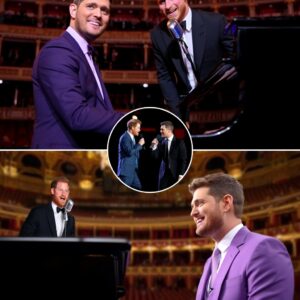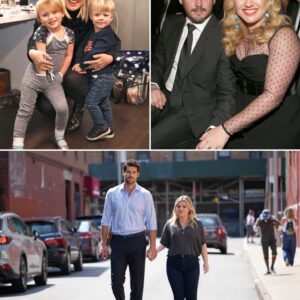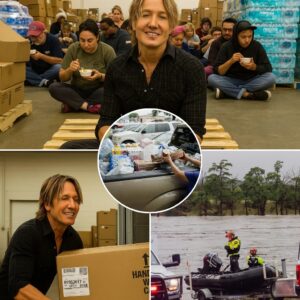“He Couldn’t Finish The Song… But Somehow, That Said Everything.” — At The Funeral Of Richard “Dick” Eastland, John Foster Took The Stage To Perform “See You Again”—But What Unfolded In That Candlelit chapel Was Something No One Could Prepare For.
As Foster began, his voice soft and trembling, you could feel the weight in every note. But halfway through the second verse, emotion overtook him. His voice cracked. He paused, lips pressed together, eyes shut tight against a flood of grief that refused to be held back. For a long moment, he stood frozen—guitar silent, words stuck in his throat.
And then… the unexpected happened….From the back pew, a single voice began to sing. Then another. And another. Until the entire room—family, friends, counselors, campers—rose to their feet and softly sang the chorus for him:
“It’s been a long day… without you, my friend…”
Tears streamed down Foster’s face as he lowered his head, letting the chorus wrap around him like the arms of a community united in loss.
It wasn’t polished. It wasn’t rehearsed. But it was perfect. Because in that moment, it wasn’t just a performance—it was a family carrying each other through the kind of goodbye that never really ends.
And when the final note faded into silence, no one moved. No one spoke. There was only breathless stillness, and the sound of quiet weeping.
It was more than a song. It was a soul leaving the room… and a thousand hearts promising to carry it forward….
Foster began to sing “See You Again,” the melody soft but powerful. The lyrics spoke of the hope of being reunited with loved ones after death, a message that seemed particularly poignant given the circumstances. As Foster’s voice filled the church, it was clear that this wasn’t just another performance—it was a personal outpouring of grief and love.

But as Foster moved into the second verse, something unexpected happened. His voice cracked, the emotion too much to bear. He choked up mid-verse, his hand shaking as he tried to continue. His eyes closed, and he paused for a moment, clearly struggling to regain composure. The mourners held their breath, unsure of what would come next.
What followed was nothing short of extraordinary. Foster took a deep breath, let the silence settle, and then, in a rare moment of vulnerability, let the final chorus of the song hang in the air like a prayer. The room seemed to hold its collective breath as the raw emotion of the moment swept over everyone present. Tears flowed freely as the mourners connected with the pain Foster was feeling, understanding that the song wasn’t just for Eastland—it was for everyone in that room who had lost someone they loved.
However, the true surprise came after the final note faded into the silence.
Instead of leaving the stage, Foster stood still, his guitar resting against his side. He turned toward the crowd, his eyes still wet with tears, and without saying a word, he stepped down from the stage and walked toward Eastland’s family. But what happened next was something no one saw coming. Foster embraced Eastland’s wife, holding her tightly as she wept in his arms. He then turned to Eastland’s children, wrapping them in a deep, comforting hug as they sobbed. The intimate moment was so raw, so powerful, that many of the mourners who had been silently weeping now openly wept for the beauty of this display of love and support.

In that moment, Foster became more than just a friend—he became part of the family. His tribute wasn’t just a performance; it was a true act of compassion, an expression of solidarity, and a reminder that, even in the most painful moments, we are not alone.
As the embrace continued, the entire church was still. It wasn’t just the loss of a friend—it was the coming together of a community in the face of unimaginable grief. The shared pain, the shared tears, were felt by everyone present, and it was clear that Foster’s raw, emotional performance had brought them all closer together, allowing them to grieve as one.
Later, Foster would speak about the moment. “It’s not about the music,” he said quietly in an interview. “It’s about remembering the people we’ve lost. It’s about showing up for those who need us most. Dick was more than a friend to me—he was family. And when you lose someone like that, the only thing you can do is be there for their loved ones. Music may bring us together, but it’s the people who stay with us, who love us, that help us get through the toughest times.”

**The tribute that day at Richard Eastland’s funeral was more than just a song—**it was a message of hope, love, and healing. It was a reminder that even in the most difficult moments, we can find strength in each other. John Foster’s decision to perform “See You Again,” to pour his heart into every note, and to offer his love to Eastland’s family, was a testament to the power of music, friendship, and community.
As the funeral came to a close, the mourners slowly filed out of the church, their hearts heavy but their spirits lifted by the powerful tribute they had witnessed. And as John Foster walked away from the stage, his heart full of emotion, he knew that the bond between him and Eastland would never be broken—that in every song, in every moment of grief, they would always find a way to remember and honor the friend who had meant so much.

The world had stopped to listen, and in that moment, John Foster had shown everyone what it means to truly love, to truly grieve, and to offer a piece of yourself to others in their most vulnerable moments. It wasn’t just the final note of the song that mattered—it was everything that came after.





